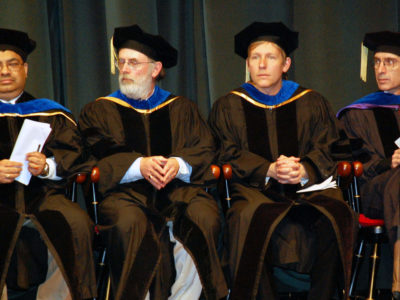We’re already well into the spring semester, but it’s not too late to start standing out in class. How to do it? The secret to succeeding in your class is knowing what your teachers want to see. Here’s what three professors from the University of Notre Dame had to say about how they perceive their students.
So you blew it on your first day of class.
You forgot to buy your textbook, you didn’t do the assigned reading or maybe you overslept and actually missed your first day of classes. Luckily, it’s not all about first impressions. Philosophy professor Paul Weithman said, “I don’t think students have to worry about distinguishing themselves on the first day of class. The students who stand out in class are those who work hard and show a genuine interest in the subject or… who evince a genuine interest in ideas. That is something we learn about our students over the course of a semester, as they write and speak for class. What happens on the first day is not all that important.”
Assuming you do make it to your first day of class, Professor of English John Sitter said all you can do is look interested: “Ask intelligent questions about the course if called for on the first day.” Film, Television and Theatre Professor Kackman also recommends bringing more questions than answers.
Are you getting on your prof’s nerves?
Professors are people, too—extremely well read, intelligent people who hold your grades in their hands. So try to find out what bugs them and do your best to avoid that behavior. Some professors might not appreciate you unwrapping your Uncrustable in the middle of class, for example. Professor Kackman said, “Ask your professor ‘did I miss anything?’ and watch her/his head explode.”
Computers in class are a controversial topic for professors and students alike. Professor Sitter said, “I discourage or flat out legislate against using computers in class because the classes I teach are small and I really want people present and making contact with each other.”
On the other hand, Professor Weithman acknowledges that computers may be useful in some of his classes and accepts the fact that, if allowed the use of their laptops, students will check their email or send the odd text. However, be warned against getting too wrapped up in cute animal pictures or the latest Facebook game—Professor Weithman said that if students are going to be entirely consumed by their technology, they should just not bother coming to class. And good luck passing that way.
Avoid the teacher’s pet mentality…
It turns out that there is such a thing as being too eager in class. While Professor Sitter said, “Too much eagerness is a good thing; you can manage that better than too little,” he and Professor Weithman caution against monopolizing class discussion or being too obsessed with grades. Professor Kackman believes that enthusiasm can be managed as long as a student is attentive to cues from his or her classmates and instructor.
…but don’t slack off.
It goes without saying that a student who only does the bare minimum to pass the class will not do as well as someone who is pushing for an A, according to Professor Weithman. “Students who participate regularly are much more likely to be invested in, and able to articulate, the nuances and complexities of the material,” said Professor Kackman.
Not the talkative type?
No problem. “Doing just the bare minimum is not at all the same thing as not trying to stand out,” said Professor Weithman. Some of his most outstanding students have been too modest or too shy to speak up in class. So if you’re not one to covet the spotlight in a lecture hall or even a small group discussion, don’t worry too much about looking like a slacker—you can stand out in other ways. “That could be a particular paper they really committed to, their contributions to an ongoing discussion arc over several classes, a particularly graceful insight, etc.,” said Professor Kackman.
Professor Sitter said, “I didn’t have any small classes in college but if I had, I would have been one of the ones who didn’t speak much. I’ve had quiet students who do really good work, thoughtful papers, thoughtful conversations outside of class.” It’s all in how you present yourself to your professors.
When in doubt, read.
The best way to stand out to your professor? Take an interest in something beyond what is assigned for class. Professor Sitter said, “The highest praise I find myself using is ‘she’s the kind of student who reads outside of the syllabus.’” It doesn’t have to be over the top, just a casual question or mention of a topic that intrigues you beyond class. All your professors want to see that spark, and you can show it to them. Assuming you don’t oversleep again.



















